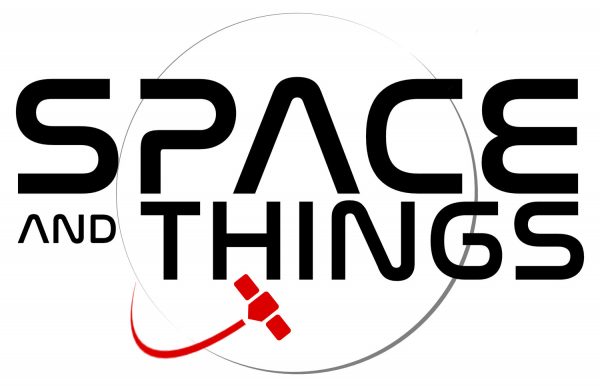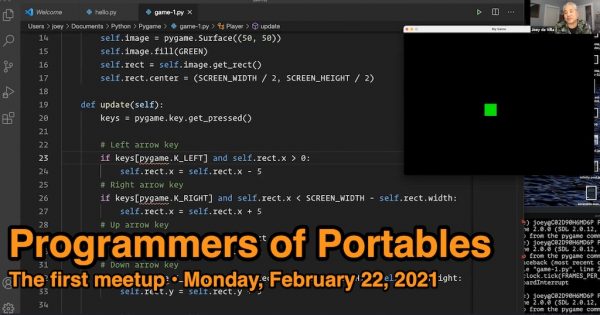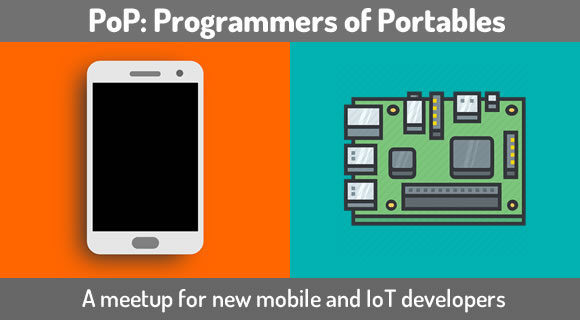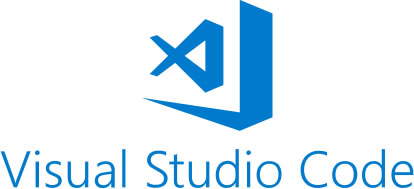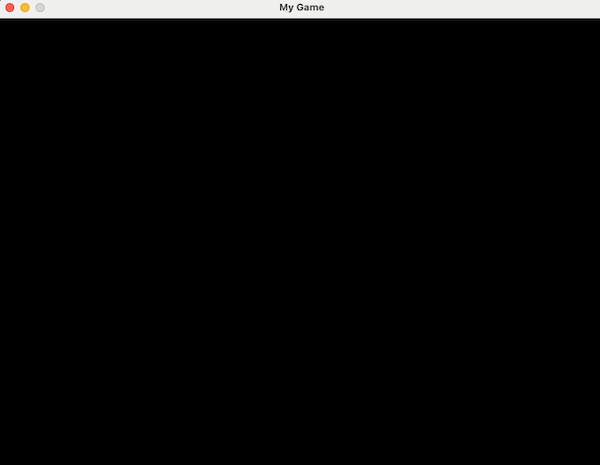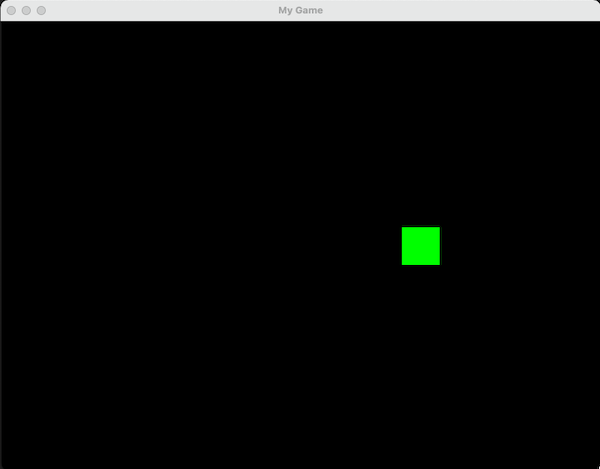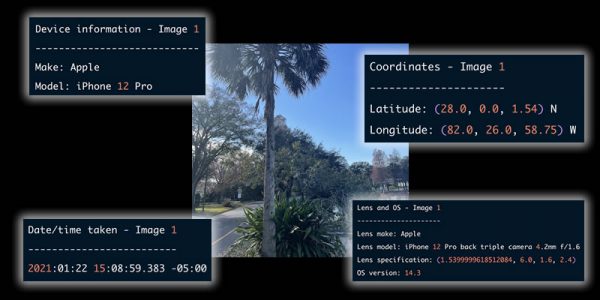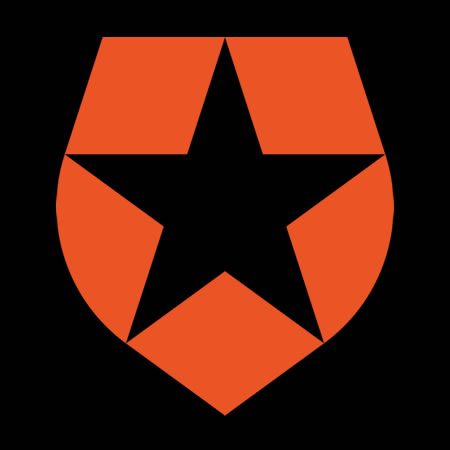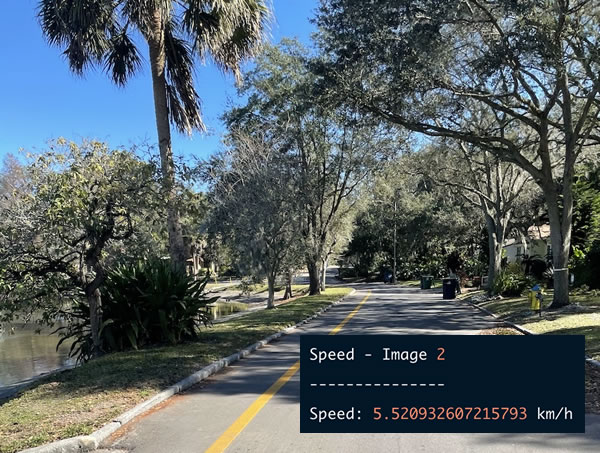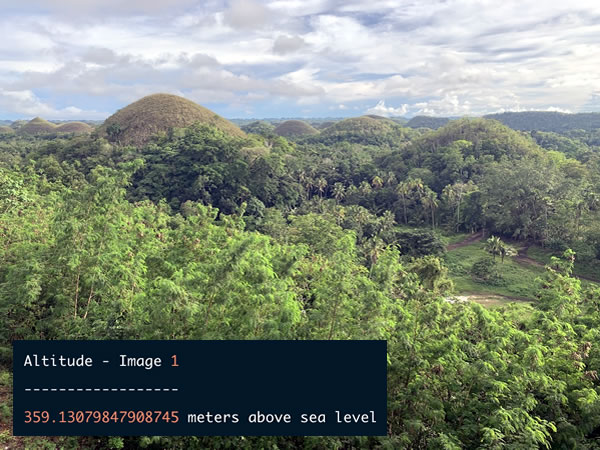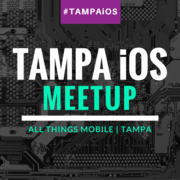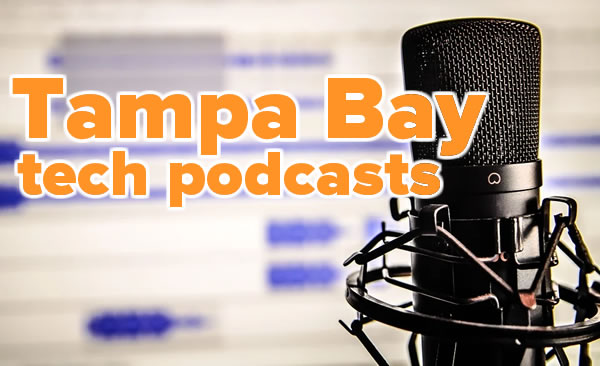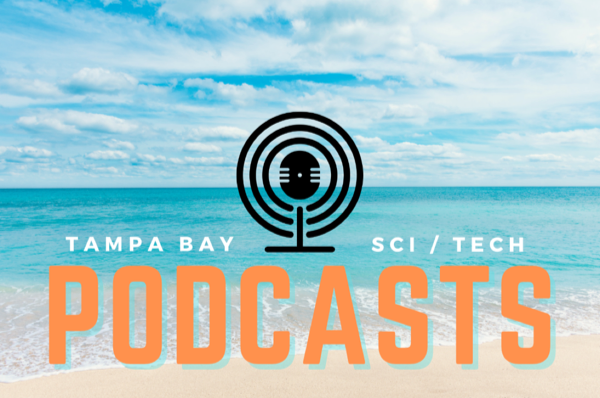
Once again, it’s time to list Tampa Bay podcasts that you, the Global Nerdy reader, might find informative, interesting, and illuminating!
In the last list, I listed the podcasts from longest-running to newest. This time, I’m doing two things:
- I’m listing them from newest to longest-running, and
- I’m adding a new podcast to the list: Space and Things, a space news, history, and science podcast. It may not be directly software developer-related, but it’s definitely software developer-adjacent, and it’s a fun listen!
And now, the podcasts…

Space and Things
Space and Things is the newest podcast on this list, and it has the distinction of being the only one here that isn’t about software development. Instead, it’s about…well, you get three guesses. Just read its name.
Space and Things features two hosts:
- Emily Carney: A veteran of the United States Navy, Carney became a freelance writer back in 2008 and started a blog called This Space Available, which is hosted by the National Space Society.In 2011, Carney founded a facebook group Space Hipsters, of which I am a member. Originally intended to be a place to share news and insights amongst friends, this community has now grown to close to 20,000 members including astronauts, engineers, scientists, historians and space flight enthusiasts from around the globe.
- Dave Giles: Giles is a singer/songwriter from London, England who has always had a passion for space flight. Since his early years he’s been looking skyward and though he ended up wielding a guitar for a living, space exploration is alway on his mind and one of his most popular songs is about astronaut Gene Cernan, ‘The Last Man On The Moon’.In 2019 to celebrate the 50th anniversary of Apollo 11, Giles visited all of the crewed space vehicles flown by NASA from Freedom 7 to the Space Shuttle Orbiters.
Here are Space and Things’ podcasts from this year. They’ve been busy:
- STP 29 – This week we talk to author, historian and curator of the Project Apollo collection at the Smithsonian National Air and Space Museum to discuss her new book, ‘Operation Moonglow: A Political History of Project Apollo’.
- STP 28 – This week Emily teaches Dave about the existence of possibly the worst space movie of all time… We’d love to know if you’ve seen it, or if you have other films which would qualify for that title.
- STP 27 – This week we break away from our normal scheduling to bring you a panel to discuss how to best support woman in the space community. Next week we’ll catch up on all the news we’ve missed this week, but we feel that this is a discussion worth having. If you have anything you’d like to contribute to the discussion please do get in touch.We asked three time space shuttle astronaut Mike Mullane and astronaut wrangler Christina Korp to join us to discuss this topic. The full video can be seen on our facebook page.
- STP 26 – What a week. Two amazing stories this week which we hope will inspire you as much as they have us!
- STP 25 – This week we preview the brand new season of Apple TV’s ‘For All Mankind’ which premiers on Friday 19th February. We were lucky to be able to talk to show’s creator Ronald D. Moore and we hope you enjoy the interview. ‘For All Mankind’ is an alternative history show which starts with the idea that the Soviet Union were the first to walk on the moon.
- STP 24 – This month is well and truly Mars month with three separate missions from three different countries arriving at the red planet, so we asked Elizabeth Howell and Nicholas Booth to join us. The pair have recently released a fantastic book ‘The Search for Life on Mars: The Greatest Scientific Detective Story of All Time’ which is well worth checking out!
- STP 23 – An action packed show for you. Loads to talk about. Chinese rockets, bio fuel rockets, space walks, SN9, mission announcements, private astronauts, Ham the astrochimp, the Apollo 14 50th anniversary, the Apollo 11 Quarantine film, the Mobile Quarantine Facility and a new Apollo 16 movie…. how do we fit it in? Well we just about did it! We hope we’ve done everything justice here.
- STP 22 – This week we have a very special interview with Ben Feist, the technical consultant for the Apollo 11 movie and the new Apollo 11 Quarantine movie. He also started the Apollo Real Time website and now works for NASA. It’s an amazingly inspiring interview. We hope you enjoy.
- STP 21 – It’s been another very busy week in the world of space flight and we do our best to bring you up to date, but we also pay tribute to Dr. William Thornton, former NASA astronaut who died aged 91 last week.
- STP 20 – We love pondering what might have happened if events transpired slightly differently, and it turns out that there are plenty of great authors who have delivered us some fantastic pieces about these very ideas. So this week we have a talk about some of our favourite alternative space histories.
- STP 19 – In our first podcast of 2021 we spend some time talking about two people from the world of space who we think have been over looked. There are obviously thousands of people who fit this bill, but this podcast isn’t going anywhere soon, so we’ll do our best!

Friends That Code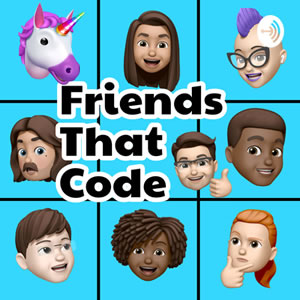
Friends That Code is hosted by Mike Traverso, whom locals may know from the Tampa Bay Google Developers Group meetup and other Google-y events. In this podcast, he showcases…
…some amazing people I know that just happen to write code for a living. Whether they started off intending to code or just happened into it, we get to hear about the types of people you’ll meet, things you’ll get to do, jobs you’ll have along the way, and advice from some awesome coders along the way!
Here are Friends That Code’s podcasts since the last time I did a roundup of Tampa Bay podcasts:
- 29 – Empower your team with shared design language with Sarrah Vesselov — Designer, Manager, Community organizer, Conference Speaker, Mentor, Author and Board Game Cafe Proprietor. Today’s guest is Sarrah Vesselov!
- 28 – How to be an awesome game developer, author, editor, speaker, etc. with Tammy Coron — Developer, Instructor, Conference Organizer, Conference Speaker, Podcaster, Senior Technical Editor and Author… Ladies and gentlemen, today’s guest is Tammy Coron!
- 27 – How to learn by teaching with Nate Ebel — Developer, Instructor, Teacher, Author, Conference Speaker, Google Developer Expert, YouTuber, Podcaster and man with a voice totally suited for crime solving serial podcasts… Ladies and gentlemen, today’s guest is Nate Eble.

The Mike Dominick Show
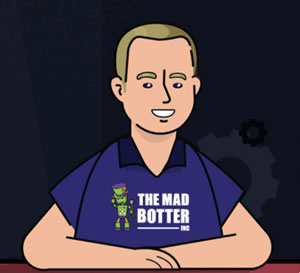 The Mike Dominick Show is the second-newest of the podcasts in this list, and it has an open source focus.
The Mike Dominick Show is the second-newest of the podcasts in this list, and it has an open source focus.
His most recent podcasts:
- 40 – Monica Ayhens-Madon
Mike sits down with Monica Ayhens-Madon to discuss the People Powered Book Club, fostering open-source and their eclectic educational backgrounds. This is an amazingly varied and fun chat! - 39 – Martin Wimpress of Canonical

The 6 Figure Developer
At the time I’m writing this, The 6 Figure Developer — hosted by John Callaway, Clayton Hunt, and Jon Ash — has posted 178 episodes. It’s…
…a show dedicated to helping developers to grow their career. Topics include Test Driven Development, Clean Code, Professionalism, Entrepreneurship, as well as the latest and greatest programming languages and concepts.
Here are The 6 Figure Developer’s podcasts since the last time I did a roundup of Tampa Bay podcasts:
- Episode 187 – Agile Conversations with Fredrick & Squirrel — Douglas Squirrel has been coding for 40 years and has led software teams for 15 of them. He is an executive coach and consulting CTO in London, making use of his extensive experience growing teams and advising startup founders and senior managers. His previous roles included founding CTO at TIM Group and VP Engineering at e-commerce startup Secretsales. He has consulted with a wide variety of London startups including Geckoboard, Lostmy.name, DueDil, Kano, and MarketInvoice.Jeffrey Fredrick is an internationally recognized expert in software development and has over 25 years’ experience covering both sides of the business/technology divide. An early adopter of XP and Agile practices, Jeffrey has been a conference speaker in the US, Europe, India and Japan. Through his work on the pioneering open-source project CruiseControl, and through his role as co-organizer of the Continuous Integration and Testing Conference (CITCON), he has had a global impact on software development. Jeffrey’s Silicon Valley experience includes roles as Vice President of Product Management, Vice President of Engineering, and Chief Evangelist. He has also worked as an independent consultant on topics including corporate strategy, product management, marketing, and interaction design. Jeffrey is currently Chief Technology Officer and Head of Product & Marketing in London at TIM, an Acuris Company. He also runs the London Organisational Learning Meetup and is a CTO mentor through CTO Craft.
- Episode 186 – GitOps with Kelsey Hightower — Kelsey is a seven figure developer and Principle Engineer for Google Cloud. On this episode we discuss the latest with GitOps, what it is and how it can help your organization.
- Episode 185 – Game Development with Lana Lux — Lana Lux joined us to talk about Game Development with Unity. Lana is a UX Designer and Game Developer based in Toronto. Currently she’s working on Strain: An apocalyptic, pandemic survival game.
- Episode 184 – Cloud Native with Facundo and Faheem — Faheem Memon and Facundo Gauna join us to talk about transitioning into Cloud-Native (Kubernetes/Docker) as a .NET Developer.Faheem is a seasoned architect with hands-on experience in application engineering, cloud, containerization, automation, and mobile technologies. Facundo is a solutions architect specializing in Kubernetes on Azure.
- Episode 183 – Developer Velocity with Amanda Silver — Amanda Silver is CVP of Product for Developer Tools at Microsoft. She was one of the primary designers on the LINQ project (Language INtegrated Query) which incorporates query expressions and XML as a first-class types in .NET. She has been involved with Chakra, the JavaScript engine that powers Edge, since 2009 which was open sourced earlier this year. In 2012, her team launched TypeScript – a cross-platform, typed, superset of JavaScript that compiles to plain JavaScript. Her team delivers the Visual Studio platform and Visual Studio Code. Unleashing the creativity of developers is her unrelenting passion.
- Episode 182 – Application Security with Tanya Janca — Tanya is Founder & CEO at We Hack Purple Academy, Community and Podcast! She’s a Best-selling author of Alice and Bob Learn Application Security.
- Episode 181 – Marten DB with Jeremy D. Miller — Jeremy Miller is a Senior Software Architect at Calavista Software. Jeremy began his software career writing “Shadow IT” applications to automate his tedious engineering documentation, then wandered into software development because it looked like more fun. Jeremy is heavily involved in open source .NET development as the author of StructureMap, Storyteller, and as the lead developer of Marten. Jeremy occasionally manages to write about various software topics at http://jeremydmiller.com.
- Episode 180 – Felienne Hermans: The Programmer’s Brain — Felienne (/Fay-lee-nuh/) is a scientist working at Leiden University as an associate professor. Her book, “The Programmer’s Brain” is out now as an Manning Books Early Access Program.The Programmer’s Brain covers everything that programmers should know about how their brains work, to make their work more effective and emphatic. The book teaches techniques for speed reading code, understanding highly complex code and choosing better variable names.
- Episode 179 – Uno Platform with Jérôme Laban — Jérôme is the CTO of the open-source Uno Platform, and a 4x recipient of the Microsoft MVP award.The Uno Platform is a framework that aims to improve the development cycle of cross-platform apps using Windows, iOS, Android, and WebAssembly using Mono and Xamarin. It is also Open Source (Apache 2.0) and available on GitHub.

Thunder Nerds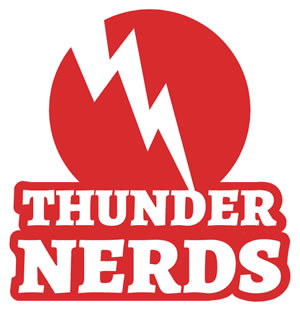
Of the podcasts in this roundup, Thunder Nerds — “A conversation with the people behind the technology, that love what they do… and do tech good” — has been around the longest, with 274 episodes over five seasons to date. You’ve probably seen the hosts at local meetups and conferences; they’re Sarrah Vesselov, Frederick Philip Von Weiss, and Brian Hinton.
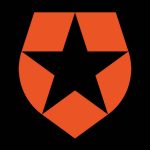 Thunder Nerds is sponsored by a company that’s near and dear to me, Auth0! That’s partly because they have a great authentication, authorization, and identity service, and partly because I work there in my role as a Senior R&D Content Engineer!
Thunder Nerds is sponsored by a company that’s near and dear to me, Auth0! That’s partly because they have a great authentication, authorization, and identity service, and partly because I work there in my role as a Senior R&D Content Engineer!
Here are Thunder Nerds’ podcasts since the last time I did a roundup of Tampa Bay podcasts:
- 278 – 🚀 Building a Community with Kent C. Dodds — In this episode, we get to speak with software engineer educator, Kent C. Dodds. We discuss community, giving back, and future technology.
- 277 – 🤖 How to Build a HomeLab with Jared Rhodes — In this episode, we get to speak with Jared Rhodes: Microsoft MVP, and Pluralsight Author. We discuss what it takes to build a HomeLab. We review the technology, hardware, software, and economic logistics to get you started.
- 276 – 🧭 Build a Safer & More Compassionate Web with Lisa Welchman & Andy Vitale — In this episode, we get to speak with Lisa Welchman & Andy Vitale. We discuss their new podcast and how we can build a safer and more compassionate web. We also chat about digital governance and how companies can own their accountability.
- 275 – 🦇 Build a Better Bat Cave with Jeffrey Zeldman — In this episode, we get to speak with King of Web Standards, Jeffrey Zeldman. We discuss the current situation with COVID and how it is impacting our lives at work. We also dive into Jeffrey’s background and lessons from his career journey. Then we chat about believing in yourself, making your own opportunities, and building a better bat cave.
